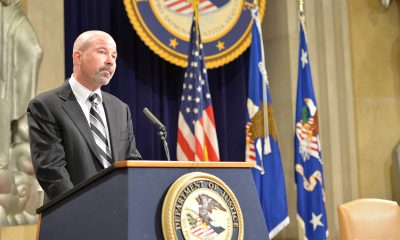Arts & Entertainment
Jasmine Guy’s world today
Actress in town this weekend with Harlem Renaissance tribute show
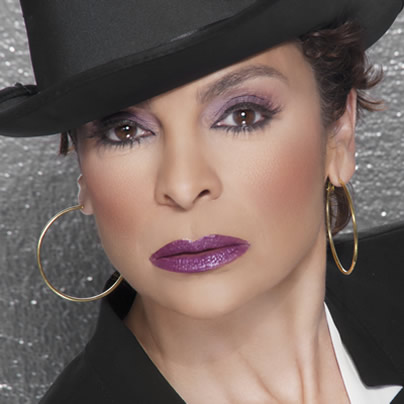
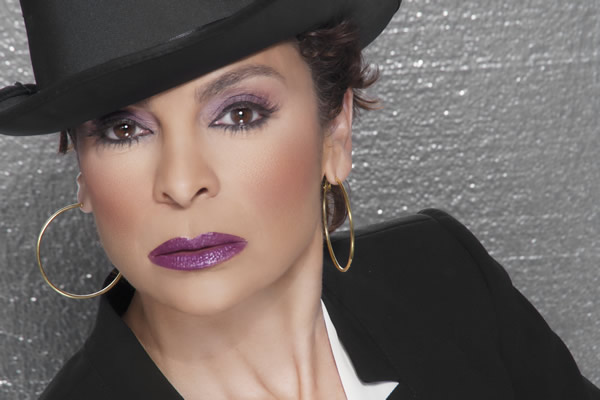
Actress Jasmine Guy says her passion for black culture in the early 20th century has kept her doing ‘Raisin’ Cane’ for five years. (Photo by Calvin Evans)
‘Raisin’ Cane: A Harlem Renaissance Odyssey’
Starring Jasmine Guy and the Avery Sharpe Trio
Saturday, 8 p.m.
Publick Playhouse
5445 Landover Rd.
Cheverly, MD
$55 VIP (includes pre-show reception)
$40 general
301-277-1710
Actress/singer Jasmine Guy will be in the D.C. area this weekend for a one-night-only performance of “Raisin’ Cane: a Harlem Renaissance Odyssey.”
We caught up with her by phone from her home in Atlanta where she answered questions about the show, gay rights, her work on the hit ’87-‘93 sitcom “A Different World” (she played spoiled Whitley for the show’s entire six-season run) and more. Her comments have been slightly edited for length.
WASHINGTON BLADE: Tell us about “Raisin’ Cane.”
JASMINE GUY: I’ve been doing the show over the past five years in various places all over the country. It grows and changes and morphs every time we do it. I do it with three other musicians — a jazz violinist, a percussionist and our composer, Avery Sharpe and we cover the decade between 1919 and 1929 of the Harlem Renaissance, right after World War I but just before the Great Depression when there was a lot of money flowing into Harlem and a lot of artists were flourishing. Painters, poets, writers, philosophers, so it was a pretty rich time in our American history. A lot of what has come down to us as Americans has come from that period as far as ways of thinking and ways of articulating our needs.
BLADE: Are you playing a specific character?
GUY: I’m like a teacher taking you through this journey. Along the way, whatever lesson needs to be taught, that’s what I do. I either reenact a scene or become another character or I dance or sing or tell a story or recite a poem — there’s a lot of all of that involved in the show.
BLADE: How did you come to the work?
GUY: Avery Sharpe and I have been friends for over 30 years and when he brought the piece to me, it started as a reading and an experimental piece to see where the interest was with people and over the last five years, it’s just continued to grow and grow. I stayed involved because of my passion for that decade and what was happening politically and historically in that time as well as artistically. It was such a fun and exciting time where jazz was birthed and we had poets like Langston Hughes and Zora Neale Hurston and painters like Aaron Douglas and philosophers like W.E.B. DuBois and Booker T. Washington and Marcus Garvey who were claiming freedom in their own way.
BLADE: African-American themes are recurring in your body of work. To what degree have you sought them out versus had them come to you?
GUY: Sometimes they intertwine. There are the roles that we pick and the roles we kind of cross paths with and we don’t really know why. There have been certain projects where I feel like I’m part of telling the truth, whether it’s “A Different World” or “Queen” (“The Story of an American Family”), or “Stompin’ at the Savoy” or “Dead Like Me,” there seems to be a certain truth to the quality of the work we’re doing at the time and I think that truth is what draws me in. I love that we tell stories that haven’t been told yet and that I’m able sometimes to get an audience to think as well as to laugh. I’m not sure which is more important, but I like that I can do both.
BLADE: Some have said gay activists who draw parallels to the Civil Rights movement are overreaching. Is that a valid line of reasoning in your opinion?
GUY: I have had friends over the years who have resented the comparison. … I think what we really all want is to be treated equally and have the right to make our own choices in our lives and in that respect, both gay rights and African-American rights have been stifled in this country and we’ve had to fight for those rights. We are still fighting in certain ways for those rights. … For some … the fight has shifted. I mean, we’re able to vote legally, we’re able to integrate, but there are still very specific things that are disproportionate in this country. There’s a huge class difference and whether you’re black or gay, there are still things we need to speak up for because in principle, it’s all the same principle. We are really all fighting for the same thing.
BLADE: With all your work in the entertainment industry, you must have worked with a lot of gays over the years. True?
GUY: Oh absolutely. I mean, you know, my world is full of gay people. I’ve been so entrenched in the gay community that it has never been a second thought to me. We are all family and because of that, I’m even more sensitive to what my gay friends go through. I’m 51, so I lived through AIDS and although I was very young when AIDS came to be, that’s when I first realized how segregated the gay community was for the rest of the world. Sometimes you forget that the world is not accepting and it takes something bad like the AIDS epidemic for you to realize. That’s when I started to realize my gay friends were heroes in their own right for having the courage to live the lives they know they want and the need and fight for the right to do that. And I don’t use that word fighting lightly, you know. I have friends who have fought all their lives, physically and emotionally. Some who have not had the support of their families. I don’t think people really understood what it means to be gay until very recently, in the last decade or so, whereas for me, it was just always a part of what I knew and understood.
BLADE: You’ve done so much work on stage, film and TV over many years and stage work, of course, by its nature is very ephemeral and fleeting. You can be on a hit show like “A Different World” that was seen by 20 million people each week, yet in some ways, it’s a small part of your overall body of work. Has that ever been a source of frustration for you?
GUY: That was frustrating for me at the beginning. I started as a dancer with the Alvin Ailey Company and yeah, I felt that, you know, my best work is probably the work that most people haven’t seen. I did have to come to terms with that because I mean, just the sheer degree of difficulty of being a dancer and being a gypsy as I was for eight years before I got “A Different World,” compared to the relative ease of being on a hit TV show, I used to think, “OK, I’ve got to make sure everybody knows that these other things are so much more worthy.” I felt it was my personal cause to let people know that, yes, I’ve worked with Judith Jamison and I know Debbie Allen and worked with Courtney Vance in “Six Degrees of Separation” and so and so. … I’ve really been surrounded by greatness and amazing talent and I’ve been in the wings of so many performances where I saw that happen before my eyes and that’s not something we’ve always been so great at being able to recreate on television. … But things are so different now and we have access to everything in a way we did not have before. That was a real turning point for me to realize that. We can say things now we could never say before on a major, major scale and we can create our own audience. It’s always interesting to me when people come up to me, what they come up to me for. I guess I’ve had enough people say, “Oh, I saw you in ‘Chicago,’” or “I remember you years ago on the Academy Awards — I didn’t know you could dance.” They might have seen that thing I thought nobody was watching. Of course, that’s nothing compared to the 20 or 30 million people that watched “A Different World” every week, but I am also proud and happy to have been part of that, too. But these other little sidebars, enough people have commented that I’ve been able to say, “OK, there’s somebody out there who’s seeing the other stuff too.”
BLADE: That said, do you have a favorite episode of “A Different World”?
GUY: My memory of certain episodes is kind of from the inside out. Like I remember doing things more than the effect it may have had on other people. I wrote a couple, so of course I remember those and, hmmm, let me see. Oh my God — we had so many great shows. I tended to like the shows where we had guest stars.
BLADE: Like Gladys Knight — I remember her appearance so vividly.
GUY: Yes, that was huge. I was so excited to get to be a Pip and sing with her and meet her. On the set at one time we had both “Superfly” and “Shaft” because Ron O’Neal played my dad and Richard Roundtree played Charnele’s (Brown, who played Kim) dad. We had Diahann Carroll, Patti LaBelle, Jesse Jackson. We had the cast of “Sarafina!” on when we did a show about apartheid. Those were the most memorable moments for me. These people would come through and we would just sweep ‘em up because by that time we had a rhythm. We just kind of knew we could be funny no matter what we talked about and that was a good place to be for the show.
BLADE: So many iconic sitcom characters don’t work as lead characters. Garry Marshall said they knew better than to try to have Fonzie carry his own show. Other times they tried and it didn’t work — like Flo from “Alice.” I know “A Different World” was still an ensemble cast at heart, yet it seemed like the show really jelled in the second season after Lisa Bonet left and your character Whitley was much more in the lead spot. Why do you think it worked so well when traditionally that type of thing hasn’t worked?
GUY: Well, we certainly weren’t sure it was going to work. That first season, I always felt we weren’t gonna make it. I had never been on a show before but it just seemed kind of dysfunctional and I didn’t feel we were putting out our best product. I was kind of thinking, “OK, that isn’t gonna work, but at least I paid off my American Express.” Then as the show grew and we were picked up year after year and with the legacy of “The Cosby Show” behind us, I started to realize we were part of a wave, a real era of change on American television. I didn’t understand at the time we were at the end of that wave. I didn’t think it would just snap back and never be seen on TV again, you know with the number of female writers and the diversity we had on our show. …. I just thought there would be a whole lot more “Different Worlds” after our show and there really weren’t. … At the time, I think I was able to make that transition because I just did what was given to me to do. I just did what was in front of me. I never thought at the time, “Oh, if Lisa leaves the show, we can still continue if Dwayne and Whitley get together” — there wasn’t any of that. That was all Bill Cosby, Debbie Allen, NBC, the writers — you know this whole team of people that revamped that show and by the second season they had totally revamped it in a way that had more of a realistic HBCU (historically black colleges and universities) feel and they just capitalized on the actors that were already with the show. They brought in Cree Summer and Charnele Brown, but there was an absolute choice made to keep that show going based on what had and hadn’t worked that first season.
BLADE: That opening credit sequence from the second season on was really incredible the way it looks like it was shot in one continuous take with the camera moving from room to room left to right. It couldn’t really have been one take, though, right?
GUY: Oh no, it took like all day long. It was green screened and there were double images — like two of me in the same shot. It was before a lot of computer graphics and things we’re able to do now so yeah. That was the brainchild of Debbie Allen and it was an all-day-long thing — like 12 or 14 hours to do that.
BLADE: Thanks for your time and good luck in the show.
GUY: Thank you.
Travel
Manchester is vibrant tapestry of culture, history, and Pride
Alan Turning Memorial is among English city’s many attractions
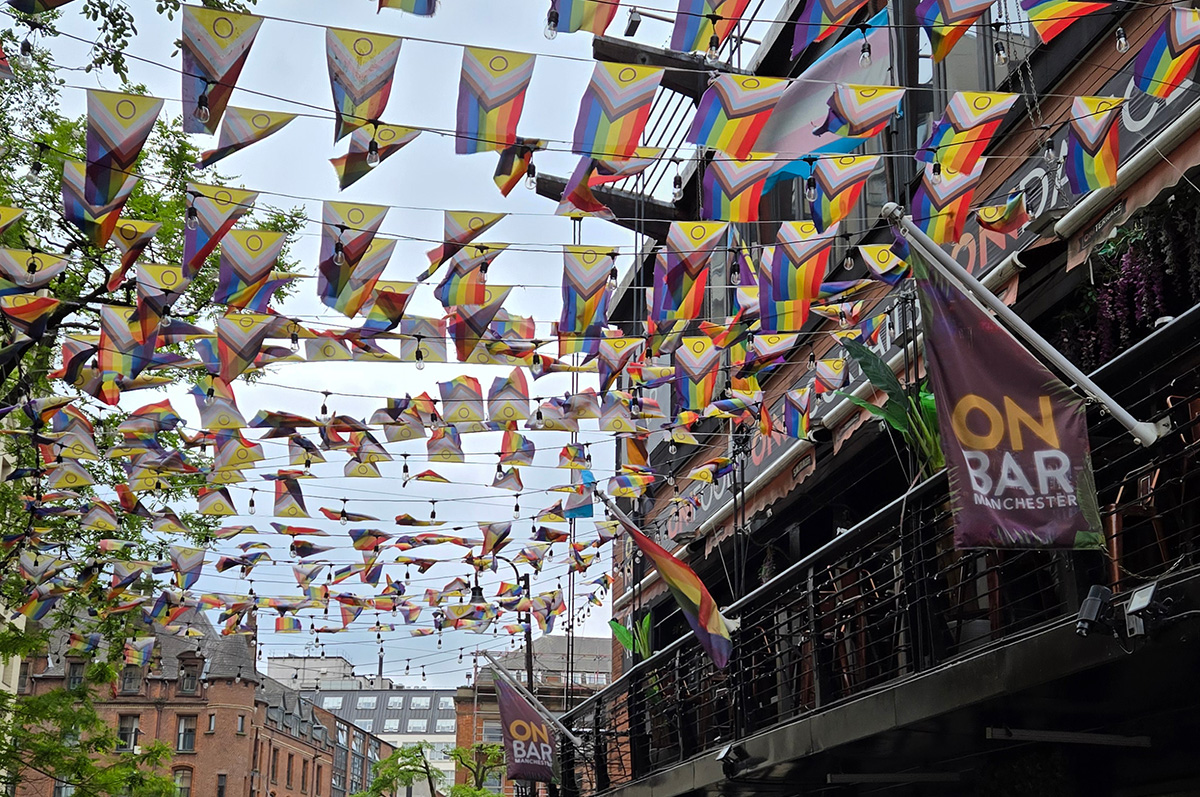
Manchester, England, is not only famous for its industrial heritage, music scene, and football clubs — it’s also home to one of the most vibrant and historically significant LGBTQ communities in the U.K. Often referred to as the “gay capital of the North,” Manchester has been a pioneer in LGBTQ rights, visibility, and celebration, cultivating a culture of inclusivity that continues to thrive today.
The roots of Manchester’s LGBTQ history stretch back centuries, but it was during the 20th century that the city truly became a hub for activism and progress. In 1880, a scandal known as the “Manchester Drag Ball” brought national attention to the city when police raided a fancy dress ball attended by men in drag. Though the incident was used to stigmatize the community, it also marked one of the first widely publicized moments of queer expression in the city.
Manchester is home to several institutions that preserve and celebrate queer history. The LGBT Foundation, based in the city, is one of the U.K.’s leading LGBTQ charities, providing health and support services as well as educational resources.
The city is also immortalized in pop culture as the backdrop for “Queer as Folk,” the groundbreaking 1999 television series created by Russell T. Davies. The show, set in Manchester’s Gay Village, helped bring the realities of LGBTQ life to mainstream audiences and played a pivotal role in shaping public attitudes.
Manchester, is a city that lives and breathes resilience. It’s a place where cobblestone streets echo with the voices of industrial workers, punk rockers, activists, and proud members of the LGBTQ community. I came here seeking stories — some hidden in old libraries, others pulsing through neon-lit streets — and left with a sense of belonging I hadn’t expected.
My base for this journey was the magnificent Kimpton Clocktower Hotel. Located in a former insurance building dating back to the 1890s, it seamlessly marries historic grandeur with modern luxury. Walking through its doors felt like entering a different era. The soaring ceilings, intricate tilework, and dramatic staircases told stories of old Manchester, while the in-room record players spinning tracks by Oasis made sure I knew exactly where I was.
The heart of the hotel is The Refuge, a restaurant and bar that buzzes with energy. Whether sipping cocktails beneath the Winter Garden’s lush greenery or sharing small plates that borrow flavors from around the world, I felt immersed in the city’s welcoming vibe. Even in its luxury, the Kimpton feels like a place for everyone, especially when there is a DJ spinning some cool jazzy beats.
One thing I loved about this property is their “Forgot it? We’ve got it” service. Whether its toothpaste, a shaving kit, or phone charger, the helpful staff have you covered. I tend to forget at least one necessity on every trip. The Kimpton’s central location places guests within walking distance of Manchester’s vibrant cultural scene, including the Palace Theatre, Canal Street, and various shopping and dining options.
My first stop in Manchester was the John Rylands Library, an architectural marvel of neo-Gothic design. I was there specifically to view “The Secret Public” exhibition. It traces Manchester’s underground art scene, especially its ties to queer culture and punk resistance. Flyers, magazines, and photographs are on display.
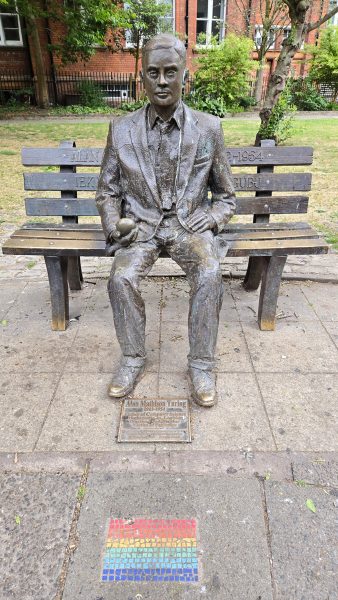
And while we are on the topic of LGBTQ history, the best way to understand Manchester’s queer roots is by talking to the locals. The Free Manchester Walking Tours offers a Queer History Tour, led by passionate guides who have in depth knowledge of the city’s LGBTQ history and culture. We began our tour in Sackville Gardens, home to the Alan Turing Memorial and the Beacon of Hope, a tribute to those affected by HIV/AIDS. It’s a space for reflection, nestled just beside Canal Street’s constant thrum. For those not familiar with Alan Turing, he was a pioneering mathematician and computer scientist, best known for his role in cracking the German Enigma code during World War II, a breakthrough that helped shorten the war and save countless lives. Often regarded as the father of modern computing, Turing laid the theoretical foundation for artificial intelligence. Despite his monumental contributions, he was persecuted for being gay, ultimately leading to his tragic death in 1954. Today, he is celebrated as both a scientific genius and a symbol of the ongoing struggle for LGBTQ rights.
No trip to Manchester would be complete without a night — or three — spent in the Gay Village. Centered around Canal Street, it’s a place that radiates warmth and freedom. What once was a hidden, underground scene in the 1980s has become a global symbol of LGBTQ pride.
During the day, you’ll find people sipping coffee along the canal and by night, the rainbow flags light up the street. Spaces like Via and the Eagle pulse with music and laughter, while Cruz 101 remains a sacred institution for dancefloor devotees. This is more than a party district; it’s a cultural hub, one that has helped shape national conversations and lead by example.
Manchester’s gay scene is more than just nightlife. In the Northern Quarter, I stumbled into Feel Good Club. a queer-owned café that quickly became one of my favorite stops during my trip. Feel Good Club is a café but the space also hosts workshops, mental wellness events, and spontaneous conversations with strangers who somehow feel like old friends. I ordered a bowl of apple-soaked oats and I have to say, it was one of the most delicious and inexpensive things I ate during my entire trip to England. I should have asked for the recipe!
A few blocks away sits Queer Lit, an LGBTQ bookstore filled to the brim with stories I wish I’d had growing up. From queer romance and fiction to books on trans identity and intersectionality, the shop is both cozy and revolutionary. Queer Lit claims to have the largest selection of LGBTQ books in all of Europe. Beyond books, the store hosts events such as workshops, live readings, and book clubs, providing a safe and inclusive space for the community to gather and celebrate queer literature. They also serve a variety of beverages. I would definitely recommend trying one of their hot chocolate drinks.
Though my trip didn’t coincide with Manchester Pride, visitors can expect tens of thousands each August. Pride here features a blend of celebration and activism. From glitter-filled marches to thoughtful panel discussions, it’s a reflection of the city itself: joyful, inclusive, and unafraid to speak truth to power. Importantly, the money raised goes straight back into the community, funding LGBTQ+ health initiatives, charities, and support services. Also in August is SCENE, Manchester’s LGBTQ+ Film and TV Festival, which consists of a week of new and classic LGBTQ cinema and TV screenings, panels, and other events.
All this touring and learning about queer history made me hungry, so for dinner, I ventured to Maray, a Middle Eastern-inspired gem in the city center. Its signature “Disco Cauliflower” — roasted whole and topped with tahini, pomegranate, and harissa — was a revelation. The food, like the city, defied expectations. It was spicy, complex and comforting. I would also recommend trying the crispy sea bass with broccoli slaw. Maray’s vibe is relaxed yet refined, a perfect place to unwind after a day of exploration. Its inclusive, welcoming spirit felt aligned with everything I’d experienced in Manchester so far.
For a more casual dining experience, head over to Freight Island, a unique food hall and entertainment venue located near Piccadilly Station. The venue features a variety of locally owned food stalls including Mia’s Arepas, Ornella’s Little Kitchen and Mega Gyros. It’s a great place to grab a quick bite or cocktail after work with friends.
Manchester may not be as polished as London, but that adds to its charm and intrigue. I tend to enjoy cities like Manchester over their larger neighbors. During my entire stay, I was able to walk to every attraction I visited and by experience, the best way to see a city is on foot. It’s also a great way to burn off those extra calories.
Whether you’re wandering Canal Street at sunset, or simply sipping hot chocolate at Queer Lit, Manchester is a place where you can be yourself and belong.
Enjoy the journey!
Books
Embracing the chaos can be part of the fun
‘Make Sure You Die Screaming’ offers many twists and turns

‘Make Sure You Die Screaming’
By Zee Carlstrom
c.2025, Random House
$28/304 pages
Sometimes, you just want to shut the door and forget what’s on the other side.
You could just wipe it from your memory, like it didn’t occur. Or create an alternate universe where bad things never happen to you and where, as in the new novel “Make Sure You Die Screaming” by Zee Carlstrom, you can pretend not to care.

Their mother called them “Holden,” but they’d stopped using that name and they hadn’t decided what to use now. What do you call an alcoholic, queer, pessimistic former ad executive who’s also “The World’s First Honest White Man,” although they no longer identify as a man? It’s a conundrum that they’ll have to figure out soon because a cop’s been following them almost since they left Chicago with Yivi, their psychic new best friend.
Until yesterday, they’d been sleeping on a futon in some lady’s basement, drinking whatever Yivi mixed, and trying not to think about Jenny. They killed Jenny, they’re sure of it. And that’s one reason why it’s prudent to freak out about the cop.
The other reason is that the car they’re driving was stolen from their ex-boyfriend who probably doesn’t know it’s gone yet.
This road trip wasn’t exactly well-planned. Their mother called, saying they were needed in Arkansas to find their father, who’d gone missing so, against their better judgment, they packed as much alcohol as Yivi could find and headed south. Their dad had always been unique, a cruel man, abusive, intractable; he suffered from PTSD, and probably another half-dozen acronyms, the doctors were never sure. They didn’t want to find him, but their mother called…
It was probably for the best; Yivi claimed that a drug dealer was chasing her, and leaving Chicago seemed like a good thing.
They wanted a drink more than anything. Except maybe not more than they wanted to escape thoughts of their old life, of Jenny and her death. And the more miles that passed, the closer they came to the end of the road.
If you think there’s a real possibility that “Make Sure You Die Screaming” might run off the rails a time or three, you’re right. It’s really out there, but not always in a bad way. Reading it, in fact, is like squatting down in a wet, stinky alley just after the trash collector has come: it’s filthy, dank, and profanity-filled. Then again, it’s also absurd and dark and philosophical, highly enjoyable but also satisfying and a little disturbing; Palahniuk-like but less metaphoric.
That’s a stew that works and author Zee Carlstrom stirs it well, with characters who are sardonic and witty while fighting the feeling that they’re unredeemable losers – which they’re not, and that becomes obvious.
You’ll see that all the way to one of the weirdest endings ever.
Readers who can withstand this book’s utter confusion by remembering that chaos is half the point will enjoy taking the road trip inside “Make Sure You Die Screaming.”
Just buckle up tight. Then shut the door, and read.
The Blade may receive commissions from qualifying purchases made via this post.

‘A Wrinkle in Time’
Through July 20
Arena Stage
1101 Sixth St., S.W.
Tickets range from $59-$209
Arenastage.org
Currently at Arena Stage, talented out actor and singer Taylor Iman Jones is rekindling an old friendship with an adored character of fiction.
Broadway vet Jones is starring as 13-year-old Meg Murry in “A Wrinkle in Time,” the world-premiere musical adaptation of Madeleine L’Engle’s same-titled book.
For many readers, especially women, the classic 1962 young adult novel, was their first foray into sci-fi, particularly one with a female protagonist.
The story centers on Meg, an awkward schoolgirl whose physicist father has mysteriously disappeared. Now, Meg, her popular friend Calvin, and smart younger brother Charles Wallace are tasked with moving through time and space to find him. Along the way they encounter adventure and evil.
For Jones, 33, playing 13-year-old Meg feels freeing in ways. She says, “As you get older, you’re told to grow up, so I like letting go of some of that. To feel feelings in their rawest form and to tap back into that is fun. I like the spontaneity. There are highs and lows to revisit.”
Born and raised in the San Francisco Bay Area, Jones began piano lessons at just six and soon added band and plays to their pursuits. Following high school, she made a deep dive into California theater for seven years before making the big move to New York in 2017 where after just two months she was singing on Broadway.
The determined and appealing Jones, who lives in New York with their partner, boasts an impressive bio. She has appeared on Broadway as Catherine Parr, Henry VIII’s sixth and final wife in Six, and in the original casts of “Head Over Heels” and “Groundhog Day.” She’s been seen in national tours of “Hamilton” and “American Idiot.”
WASHINGTON BLADE: It seems “A Wrinkle in Time” and Meg mean a lot to a lot of people.
TAYLOR IMAN JONES: The book tells the story of a girl with so much undiscovered power who’s accomplishing things she never imagined that she could.
BLADE: Can you relate?
JONES: Meg wears her emotions on her sleeve. I can certainly relate to that. I’m a Pisces. Sometimes being hyperemotional and very empathetic can feel like a burden, but as I’ve matured, I have realized that it’s not a bad quality. And it’s something I’ve learned to harness and to enjoy. I love that I can play a role like Meg in front of thousands of people.
BLADE: Was “Wrinkle in Time” a book you knew well?
JONES: Oh yeah, it’s a favorite book that lives in my heart and my mind. It’s one of the first books that taught me about the adventure of reading.
BLADE: And playing a favorite character must be a kick.
JONES: It really is.
BLADE: Meg is a big part in a big show.
JONES: This musical is huge. They’re traveling through space and meeting people on different planets. 20-person cast. 30 songs in the show. Quite the undertaking and I’m proud of us. I’m on stage for the entire musical and I sing four or five numbers.
As a mezzo soprano I guess you’d say I have the luxury of being able to do a lot of musicals that span a lot of different genres: rock musical, pop musical, and standards. “A Wrinkle in Time” is contemporary musical theater.
For me, singing is probably the least difficult part of the show. What’s harder for me is the way Meg experiences trauma; I need to be careful when I’m screaming and yelling.
BLADE: It seems mostly women have been involved in making this production happen (book by Lauren Yee; music and lyrics by Heather Christian; directed by Lee Sunday Evans; and choreography by Ani Taj.)
JONES: It’s true, the director, writer, etc., and most of our producers are all women. This doesn’t happen most of the time. For me it means new ideas and fresh energy, and pushing the limits of musical theater.
It’s also created a wonderful space in which to work. It can be more generous, and understanding. And centering the story on a young girl is something we can all relate to.
BLADE: Will “A Wrinkle in Time” resonate with queer theatergoers and their families?
JONES: I think so, especially on the heels of pride month. It’s truly a show for all ages about finding your inner strength and fighting for the things that you love; not letting evil win over the power of good, and not just for yourself but for those around you too.



